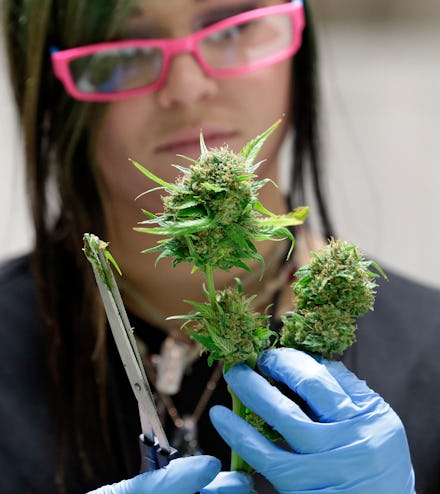Jobs in the Marijuana Industry: These 6 Professions Sprouted From the Pot Industry

Marijuana is legalized in 23 states, including Washington, D.C., proving the industry is growing — both socially and economically. In 2013, the marijuana industry was mainly medical and worth about $1.8 billion, CNN reported. Two years later in 2015, the industry has been estimated at $5.4 billion, according to research from cannabis industry firm ArcView Group, CNN reported.
"Marijuana is not that different than other industries, and it's not just about the plant. There's a need for people to work in accounting, finance, legal, HR, etc.," marijuana job website WeedHire.com founder David Bernstein said, according to Yahoo. At the end of 2014, almost 16,000 people were licensed to work in the marijuana industry in Colorado. That's a 143% increase from 2013. Needless to say, this is the perfect time for people to cash in on some green.
Read more:
However, with breaking down boundaries comes an unprecedented territory, so both states and private businesses are still trying to set up efficient regulatory systems, especially in places like California and Washington, D.C. After all, marijuana is still labeled as a Schedule I drug, along with heroin.
Regardless, the industry is booming, and new, validated professions have emerged directly from it. These days, it's not just a weed dealer.
1. Trimmer
It sounds tedious but being a marijuana trimmer is a legitimate profession in the industry, consisting of pruning the leaves from the buds with a pair of small scissors, High Times reported. The wages can be up to $15 an hour, but is the perfect entry-level job to get a foot in the industry's door. Eventually, workers can gain enough experience and learn enough about the plant to become a gardener or open a retail shop. Some people head right toward marijuana farm hotspots like Humboldt County in California for seasonal harvesting time.
2. Glassblower
The demand for devices to smoke marijuana is increasing as legalization does as well. Glassblowers will be able to be more creative and create pipes, accessories and water pipes that will blow away the user. It's becoming a more acceptable art for, and now artists are able to charge higher prices for more beautiful pieces, the Boston Globe reported.
3. Cannabis extractor
The future of cannabis consumption is arguably by high-tech extracted forms, such as concentrates like butane hash oil, which can be found as wax or shatter. Creating a concentrate requires advanced chemistry skills, experience and proper lab equipment, and doing it without all of those three can result in an unsafe disaster or explosion, the New York Times reported. To manufacture clean concentrates, professionals use products such as organic alcohols, vacuum pumps and freezers in a totally sterile environment (since dust could ruin a batch), according to High Times.
"Cannabis extracts as a whole — butane extracts in particular — are kinda getting a bad reputation," marketing director for Sirius Extracts Brandon Krenzler said, according to the San Francisco Chronicle. "The professionals are left with a PR mess, they are forced to prove what they do is proper, clean, safe, organized and consistent." He later called extracts the future of the industry, as more people seek purer products.
4. Budtender
This job is the marijuana equivalent to a bartender. Budtenders work a marijuana dispensary's counter, recommending strains and products based on a customer's tolerance and needs — essentially, educating the interested public. A prospective budtender has to be licensed with the Marijuana Enforcement Division, which could take a while, but seems to be well worth it. "People need to educate themselves instead of just being like 'pot is bad' — they don't know the positive effects that marijuana can have on you," Colorado budtender Sloane Poorman told Mic in 2014. "I mean, we have cancer patients and people who have been injured."
5. Grower
The bud has got to come from somewhere. Growers can use both artificial and natural light to grow their plants, which in Oregon, can be as many as the property can fit, according to CNN. Some growers in Washington, Oregon and California are working on ways to build a standard for sustainable grown marijuana. Also, growers must test their cannabis' THC levels.
Monkey Grass Farms in Washington, a family-owned farm with over 21,000 square feet used for indoor growing, sees the future of farming as sterile, food packaging industry-like production, according to Mashable. The farm supplies up to 20 pounds of marijuana per week to Washington-based shops.
6. Reviewer
For true marijuana fans, a dream job could arguably be becoming a marijuana reviewer. With this job, someone with considerable knowledge of strains and products can test out new products to share its effects with the public, according to the New York Daily News. "I have the luxury of smoking the best weed in the world on a weekly basis, so they have some catching up to do," Colorado weed reviewer for the Denver Post, Jack Browne, said, according to the New York Daily News.